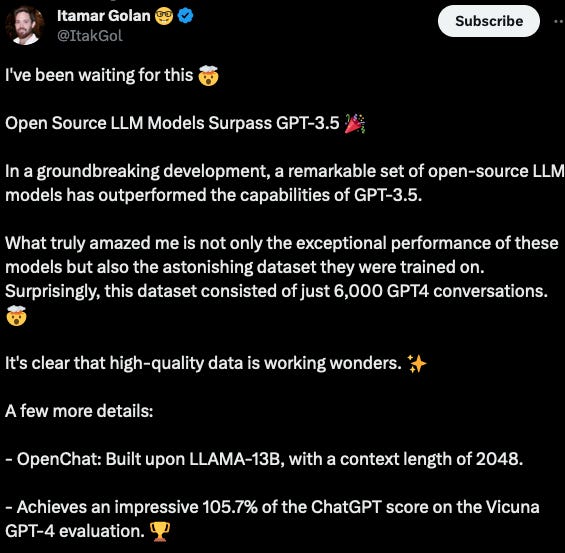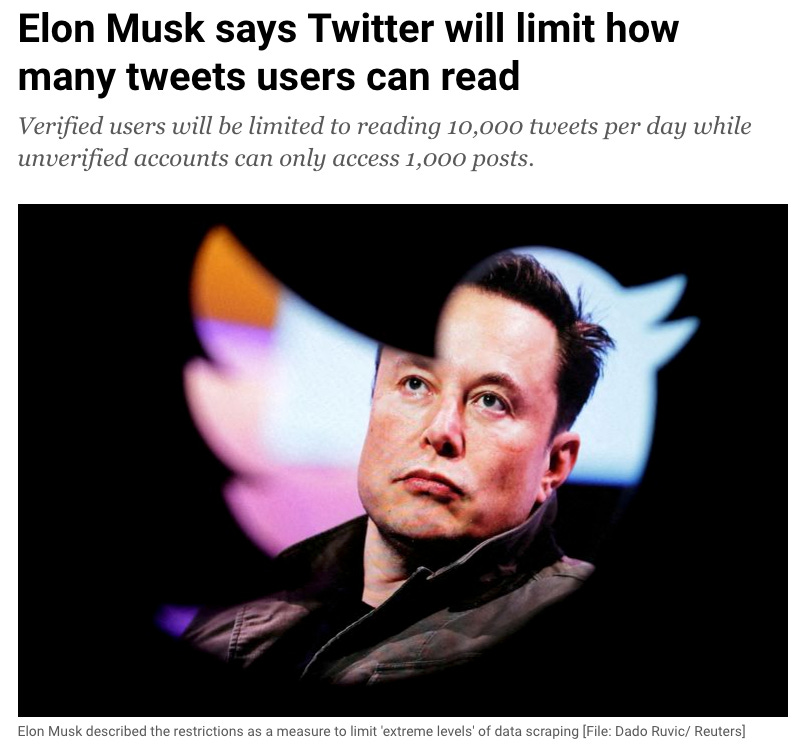keeping friends, intelligence explosion & standard confusion
CC#63 - Open Source Better than GPT, Dealing with Aging & Johnny can't prompt
Hey there and welcome to ✨ CuratedCuriosity - a bi-weekly newsletter delivering inspiration from all over the internet to the notoriously curious.
Things I Enjoyed Reading.
Friendship plays such a huge role in our lives - comparatively little attention is put on establishing routines that help us retaining them. Here is a list of (at least in my mind) quite sensible advice.
Develop an internal clock that tells you when to reach out to a friend. Like, you want to get to a point where you’re sitting there working one day and your inner voice is like hey it’s been three weeks since you saw X, you should text him. I would personally never use a social calendar so I live and die by my internal friend clock lol.
Proactively ask about your friends’ lives. A lot of people have trouble talking about stuff that’s troubling them… it’s on you to ask. Choose friends whom you’re genuinely interested in—people can sense it when you’re asking out of obligation rather than interest.
🧓 Sorry Dr. Coughlin, “aging” and “old age” are real, and they suck
There is different ways how people think and talk about aging. It is a hard reality that we all have to face that getting old isn’t fun - however, refusing to accept this is most probably not a meaningful way to deal with it.
Coughlin began his talk by claiming that our entire conception of “old age” is based on a faulty theory about “vital energy” that was popularized in the 1800s. According to this theory, people used up “vital energy” by doing things like work and having sex, eventually reaching a “low battery state” where they need to rest and conserve what little energy they had left. This faulty theory, according to Coughlin, is responsible for the belief that people become more fatigued as they get older, as well as the belief that people should retire so they can rest and conserve what little vital energy they have left. According to Coughlin, both of these beliefs are faulty.
Most shockingly, Coughlin boldly proclaimed that “aging is not a problem to be solved”. My jaw literally dropped upon hearing this, in disbelief at the chutzpah and utter disregard for reality on display.
Coughlin’s talk was very disrespectful to millions of people worldwide who are suffering from the ravages of aging. This issue is personal for me. I watched my grandmother struggle with severe dementia for years along with mobility issues and glaucoma. I also watched my grandfather’s quality of life slowly decline due to aging, robbing him of his mobility, quality of life, and dignity.
🧠 Carl Shulman (Pt 1) - Intelligence Explosion, Primate Evolution, Robot Doublings, & Alignment [🎧]
Obviously there couldn’t be an edition of this newsletter without a sprinkle of AI - this is a really interesting and thought provoking interview on how a future with ‘intelligence explosion’ might look like.
This part is about Carl’s model of an intelligence explosion, which integrates everything from:
* how fast algorithmic progress & hardware improvements in AI are happening,
* what primate evolution suggests about the scaling hypothesis,
* how soon before AIs could do large parts of AI research themselves, and whether there would be faster and faster doublings of AI researchers,
* how quickly robots produced from existing factories could take over the economy.
Food for Thought.
🤯 I guess we are entering a new era?
⧳ I have been struggling with this difference myself quite a bit when trying to understand some research papers - not sure if this recent evidence that I am not along is comforting or scaring…? Link to the paper
Random Stuff.
🐟 The Washington post recently had a very cool visual article showing how ‘missing data’ from boats’ location transponders can help identify outlaw fishing.

🐦 Twitter is now limiting the number of tweets users can read per day in attempt to prevent scraping. Will be interesting to see whether other ‘public’ data sources commonly used for algorithm training will follow the example…
🤔 Yes there is more to prompt engineering than just trial and error - cool paper!
Personal Update.
Bear with me lots of updates this time^^
Last week we published my most favourite episode of the PhD Pod so far - its all about trust in health care systems and doing fieldtrips. Super fascinating insights for someone like me who mainly works with computers (and not so much actual humans):
I spent some time learning Nextjs and playing around with the ChatGPT AI - the result is small application that can be used to create drafts for literature reviews. It probably still has quite a few bugs but if you have an OpenAI API key you can test it here. Below you can also find a short video that shows how it works.
Spent last week in Oxford on a summer school in ‘network economics’. And no its not - as some of my friends assumed - a summer school for economists to network, but rather classes teaching you to apply network science to economic topics (trade networks, cryptocurrency networks, urban mobility networks…). Although I have to admit there was a decent part dedicated to networking as well…
Also, I have to say Oxford was even more like Hogwarts than I had expected - one could almost believe that Harry and his friends would come around the corner any time.
Finished reading Tomorrow, tomorrow and tomorrow - really enjoyed it. Here is another beautiful quote to get you intrigued: “And what is love in the end? Except the irrational desire to put evolutionary competitiveness aside in order to ease someone else’s journey through life?”








